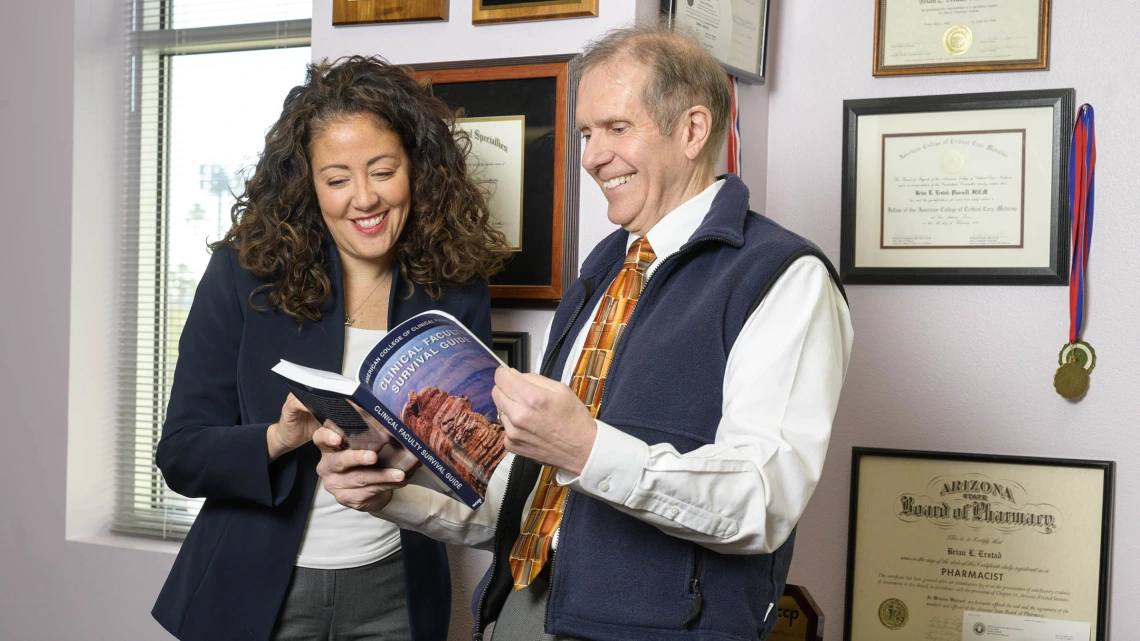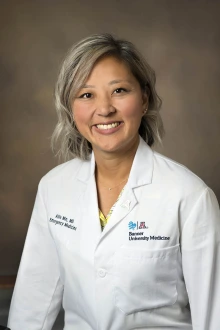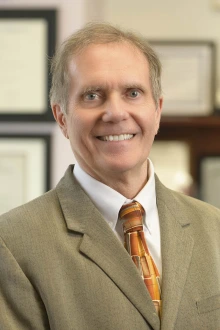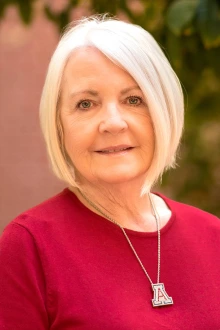Early-Career Faculty Success Supported by Colleges
Health Sciences colleges support early-career faculty members with programs aimed at promotion and tenure.

Elizabeth Hall-Lipsy, JD, MPH, and Brian Erstad, PharmD, review the chapter Dr. Erstad wrote for a faculty survival guide that provides tips and what questions faculty should ask when being hired.
Early-career faculty face unique challenges as they juggle priorities that can include teaching and advising students, securing research funding, getting papers published and navigating organizational change, to name a few. Many colleges at the University of Arizona Health Sciences have people and programs in place to better focus on needs of early-career faculty looking for a clear path toward advancement, whether their roles are clinical, educational, research, service outreach or a mix of those missions.
Colleges of Medicine – Tucson and Phoenix
Both the College of Medicine – Tucson and College of Medicine – Phoenix have developed mentoring programs of their own in addition to leveraging the university’s career development programs, mentoring and other resources available through the Vice Provost’s Office of Faculty Affairs.
Allie Min, MD, associate dean for career development at the College of Medicine – Tucson, said the College of Medicine Peer Advancement Societies (COMPAS) program is just one of several the college created, including a popular Faculty Learning Exchange podcast, or FLEXcast, started just before the pandemic to support early-career and mid-level faculty advancement.
Dr. Min, also a professor of emergency medicine, recalls a pandemic shift from large-group new faculty orientation meetings, which could be impersonal via Zoom, to more one-on-one meetings to offer personal advice on career advancement. Social distancing meant newer faculty didn’t get to know as many people in their college. They often were secluded in their labs or clinics and, as faculty returned to campus, they craved reengagement.

Allie Min, MD, assistant dean for career development in the UArizona College of Medicine – Tucson’s Office of Faculty Affairs.
“They started in isolation. Because of all this, people really are finding any venue, any event, whatever gets people together face-to-face,” she said. “They really love finding connections that way.”
COMPAS, which Dr. Min helped launch in 2015, supplements departmental mentoring efforts among early-career faculty and expands networking and collaborations across departments. Each COMPAS cohort is assigned a Dean’s Council of Faculty Affairs member to act as their “navigator” for the six-month program.
At the College of Medicine – Phoenix, a faculty peer mentoring program called LIFT – Leading and Inspiring Faculty Trajectories – began in 2017, said Guadalupe “Lu” Federico-Martinez, PhD, assistant dean of faculty affairs and career development, and an associate professor of internal medicine.
LIFT includes on-demand learning modules and is designed to “help the faculty achieve the end-goal they want,” said Dr. Federico-Martinez. If it’s a tenured professorship, that can take a decade or more of robust research and teaching evaluations.
“The department chair has their vision for the department and, together, the chair and college work to keep faculty encouraged, motivated and believing in themselves,” added Dr. Federico, who also is chair-elect for the Association of American Medical Colleges’ Group on Faculty Affairs.
R. Ken Coit College of Pharmacy
Early-career success begins with questions asked on both sides of the hiring process, said Brian Erstad, PharmD, professor and head of the Department of Pharmacy Practice and Science in the R. Ken Coit College of Pharmacy.

Brian Erstad, PharmD, professor and head of the Department of Pharmacy Practice and Science in the R. Ken Coit College of Pharmacy.
Throughout Dr. Erstad’s 40-year career, he’s had almost every role a pharmacist can have, from community pharmacist to clinical assistant professor to tenured professor.
“I’ve seen it from all angles. And having been an administrator now for 10-plus years, I’ve seen it from that end, too,” Dr. Erstad said. “Looking back, I’m actually pretty impressed with the questions in that book. There aren’t any huge things I would add.”
Elizabeth Hall-Lipsy, JD, MPH, can relate. She’s a public health attorney who joined academia after private practice to head the Coit College of Pharmacy’s Rural Health Professions Program. She calls herself “an ugly duckling who doesn’t fit in, but is real happy swimming amongst the ducks.”
Dr. Erstad helped her navigate a promotion to associate professor last year.
“He’s just a phenomenal department head. I knew I would be an extremely challenging faculty member to support for advancement,” Hall-Lipsy said, referring to her unusual educational and work background for a College of Pharmacy faculty member.
Since last July, Hall-Lipsy has overseen academic affairs as assistant dean at the college which includes helping in the promotion process. She said she hopes to advance an inclusive approach that builds on the university’s existing programs to support development of new and continuing faculty.
“I would have to say the University’s Faculty Affairs office has made a really concerted effort to support and develop faculty as well as recruit and retain diversity among them, and I'm really appreciative of that,” she said. “They set up a really fantastic roadmap and resources to guide faculty.”
College of Nursing

Cindy Rishel, PhD, RN, interim assistant dean for academic affairs and faculty affairs at the UArizona College of Nursing
Dr. Rishel and Sheila Gephart, PhD, RN, interim chair of the Biobehavioral Health Science Division, both say the College of Nursing relies on the university’s extensive guidance and resources for faculty through its Faculty Affairs office. For mentoring, they use a mentor model to help faculty adjust to teaching expectations and recommend faculty participate in Center for the Integration of Research, Teaching and Learning (CIRTL) activities through the Office of Academic Affairs. CIRTL offers a free, self-paced professional development program that prepares graduate students and postdoctoral researchers to teach in higher education and is linked to a national network.

